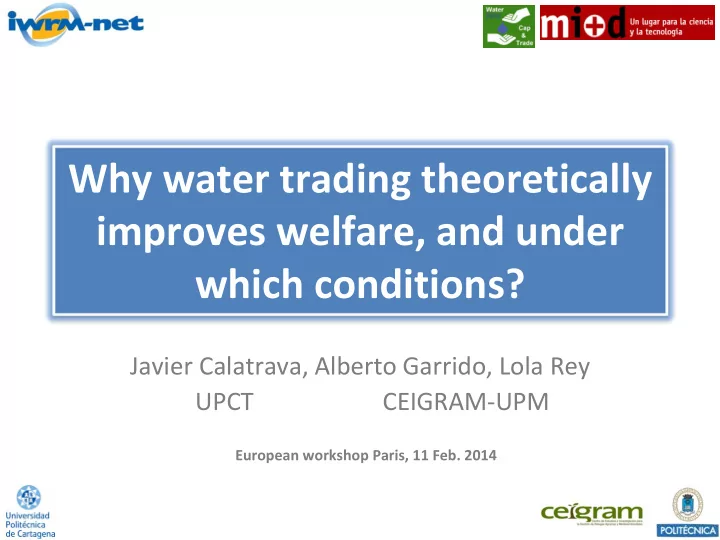

Why water trading theoretically improves welfare, and under which conditions? Javier Calatrava, Alberto Garrido, Lola Rey UPCT CEIGRAM ‐ UPM European workshop Paris, 11 Feb. 2014
What is a Water Market? What is a Water Market? • Any institutional framework that allows two users to exchange water or water rights, voluntarily agreeing the conditions of the exchange. • Trading decisions are voluntary and provide mutual benefit • The context is that of water scarcity, either structural or temporary
What are the advantages of WMs? What are the advantages of WMs? • Increases efficiency in water allocation • Flexible water allocation mechanism • Disseminates information about the real value of water • Stimulates water saving • Lower cost alternative to developing new water supply • Reduces water supply risks and uncertainty • Can be adapted to different institutional frameworks to satisfy different water policy needs
What are the disadvantages? What are the disadvantages? • Can increase pressure on water resources • Can mobilise unused rights • Can result in inefficient allocations due to: – Poorly defined water rights – Thinness: reduced activity/price dispersion. – Market power / Speculative behaviour – The stochastic nature of water availability – Transaction costs – External effects • This is affected by the type of water market, water rights and regulatory framework
Potential externalities Potential externalities • Problems of very different nature and highly dependant on: – The spatial and sector extent of water trading – The existence of property rights – The type of water market • Impact on return flows and their users • Social effects (employment, equity, traditional irrigation) • Environmental effects (river flows, salinity, pollution) • Solutions: clear definition of property rights, public control, restrictions to trading, systems for conflict resolution, compensation schemes, cooperation
Concluding remarks • Water markets increase the total economic value of scarce water resources and provide flexibility to water allocation • Reduce the economic vulnerability of water users facing water supply risk and uncertainty • WMs benefits increase with their spatial and sector extent but so do also their drawbacks • They require an adequate institutional and regulatory framework to prevent externalities and other market failures and guarantee an overall net social benefit
Next presentation: Water markets in EU agriculture: results from ex ‐ ante economic evaluation. Davide Viaggi European workshop Paris, 11 Feb. 2014
Recommend
More recommend